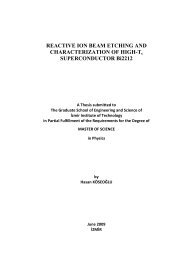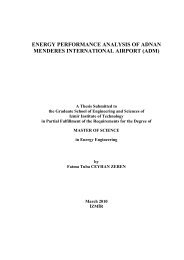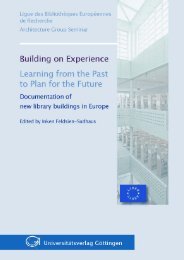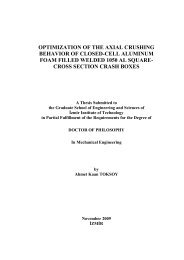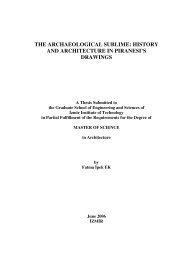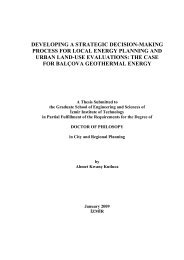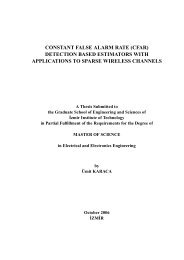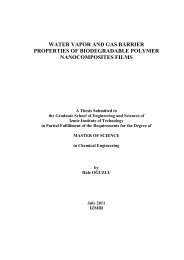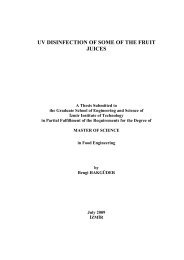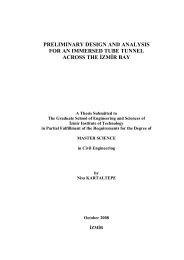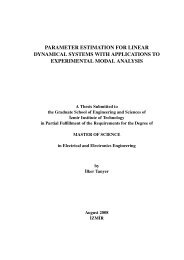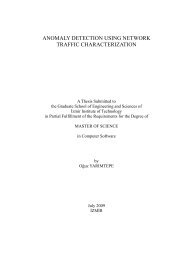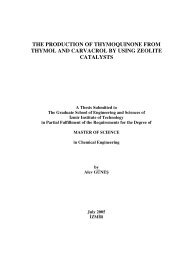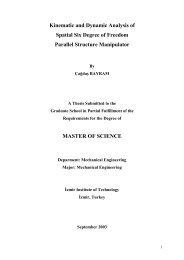a critical evaluation on the concept of justice in planning process
a critical evaluation on the concept of justice in planning process
a critical evaluation on the concept of justice in planning process
Create successful ePaper yourself
Turn your PDF publications into a flip-book with our unique Google optimized e-Paper software.
. urban land becom<strong>in</strong>g a pr<strong>of</strong>it tool rapidly,<br />
c. dissoluti<strong>on</strong> <strong>of</strong> development paradigm.<br />
This <strong>process</strong>, questi<strong>on</strong>s what <strong>the</strong> “public <strong>in</strong>terest” <strong>on</strong> which plann<strong>in</strong>g discipl<strong>in</strong>e<br />
is founded as a public activity, means with <strong>the</strong> transformati<strong>on</strong> <strong>of</strong> development policies.<br />
This transformati<strong>on</strong> <strong>process</strong> shows that <strong>the</strong> transformati<strong>on</strong> <strong>of</strong> <strong>the</strong> mean<strong>in</strong>g <strong>of</strong> “public<br />
<strong>in</strong>terest” which basis <strong>of</strong> “<strong>justice</strong>” c<strong>on</strong>cept and practice.<br />
Plann<strong>in</strong>g activity propose a series <strong>of</strong> <strong>in</strong>terventi<strong>on</strong>s to <strong>the</strong> urban space accord<strong>in</strong>g<br />
to prelim<strong>in</strong>ary acceptances about which rati<strong>on</strong>alities are necessary <strong>in</strong> giv<strong>in</strong>g decisi<strong>on</strong>s<br />
about urban spaces as public areas. Am<strong>on</strong>g <strong>the</strong>se rati<strong>on</strong>alities, it orients toward <strong>the</strong><br />
usage <strong>of</strong> urban space (physical and n<strong>on</strong>-physical geography) as a social area and<br />
towards <strong>the</strong> social and <strong>in</strong>dividual plann<strong>in</strong>g pr<strong>in</strong>ciples <strong>of</strong> this usage and somewhat tries<br />
to determ<strong>in</strong>e <strong>the</strong> practical <strong>process</strong> by <strong>the</strong>se pr<strong>in</strong>ciples. Whe<strong>the</strong>r clearly expressed or not<br />
mostly a “<strong>justice</strong>” acceptance take place am<strong>on</strong>g <strong>the</strong>se pr<strong>in</strong>ciples and <strong>the</strong> plann<strong>in</strong>g<br />
discipl<strong>in</strong>e as a public activity aims <strong>the</strong> applicati<strong>on</strong> <strong>of</strong> pr<strong>in</strong>ciples about realiz<strong>in</strong>g <strong>the</strong><br />
“just” physical space plann<strong>in</strong>g’s. Land-use decisi<strong>on</strong>s as meet<strong>in</strong>g <strong>the</strong> needs at m<strong>in</strong>imum<br />
levels takes place am<strong>on</strong>g <strong>the</strong> tools <strong>in</strong> realiz<strong>in</strong>g <strong>the</strong>se aims. In Turkish practices, health,<br />
educati<strong>on</strong>, socio-cultural area, technical <strong>in</strong>frastructure areas and <strong>the</strong>ir areas per pers<strong>on</strong><br />
can be counted am<strong>on</strong>g <strong>the</strong>se needs which were def<strong>in</strong>ed by act no. 3194. The comm<strong>on</strong><br />
and equal distributi<strong>on</strong> <strong>of</strong> <strong>the</strong>se spatial needs which are locati<strong>on</strong> selecti<strong>on</strong> criteria, is<br />
guaranteed by <strong>the</strong>se law and at <strong>the</strong> same time <strong>on</strong>e <strong>of</strong> plann<strong>in</strong>g pr<strong>in</strong>ciples is carried al<strong>on</strong>g<br />
to <strong>the</strong> legal platform with this law. However, it is evident that <strong>the</strong>se criteria were not<br />
realized as plann<strong>in</strong>g pr<strong>in</strong>ciples determ<strong>in</strong>ed by legal arrangement accord<strong>in</strong>g to <strong>the</strong> results<br />
<strong>of</strong> sample field survey. Additi<strong>on</strong>ally, it should be stated also, that <strong>the</strong>re is no case or<br />
disagreement about <strong>the</strong> unapplicati<strong>on</strong> <strong>of</strong> <strong>the</strong>se criteria and legal arrangement. Whereas,<br />
this legal arrangement represents <strong>the</strong> right to live <strong>in</strong> a healthy envir<strong>on</strong>ment also def<strong>in</strong>ed<br />
by <strong>the</strong> C<strong>on</strong>stituti<strong>on</strong>. At this po<strong>in</strong>t, it is seen that although this right which takes place<br />
am<strong>on</strong>g <strong>the</strong> C<strong>on</strong>stituti<strong>on</strong>al rights and legal rights and which is def<strong>in</strong>ed by <strong>the</strong> laws does<br />
not have a resp<strong>on</strong>se <strong>in</strong> practical <strong>process</strong>es. Arguments about <strong>in</strong>sufficient facility areas<br />
<strong>on</strong> urban land are way <strong>of</strong> c<strong>on</strong>sider<strong>in</strong>g this problem as a technical <strong>process</strong>. However, this<br />
technical <strong>process</strong> represents <strong>the</strong> rights <strong>of</strong> urban settlers, <strong>the</strong> start<strong>in</strong>g po<strong>in</strong>t <strong>of</strong> <strong>the</strong> basic<br />
human rights <strong>in</strong> practis<strong>in</strong>g <strong>the</strong>se rights and <strong>the</strong> simplest expressi<strong>on</strong> <strong>of</strong> a “just” <strong>process</strong>.<br />
It is seen that <str<strong>on</strong>g>evaluati<strong>on</strong></str<strong>on</strong>g> about provid<strong>in</strong>g <strong>the</strong> “just” distributi<strong>on</strong> as meet<strong>in</strong>g <strong>the</strong><br />
spatial needs <strong>on</strong> physical space are not <strong>on</strong> <strong>the</strong> agenda <strong>in</strong> Turkish practices. Ano<strong>the</strong>r<br />
po<strong>in</strong>t that should be evaluated is what k<strong>in</strong>d <strong>of</strong> a distributi<strong>on</strong> <strong>process</strong> occurs am<strong>on</strong>g <strong>the</strong><br />
186



